ROBERT WILLIAMS BUCHANAN (1841 - 1901)
|
ROBERT WILLIAMS BUCHANAN (1841 - 1901) |
|
|
|
|
|
|
|
|
{Ballad Stories of the Affections. From the Scandinavian 1866}
1
WHERE the sea is smiling Where life and beauty But go there, lonely, It is the olden, Where now is moorland, A wondrous region |
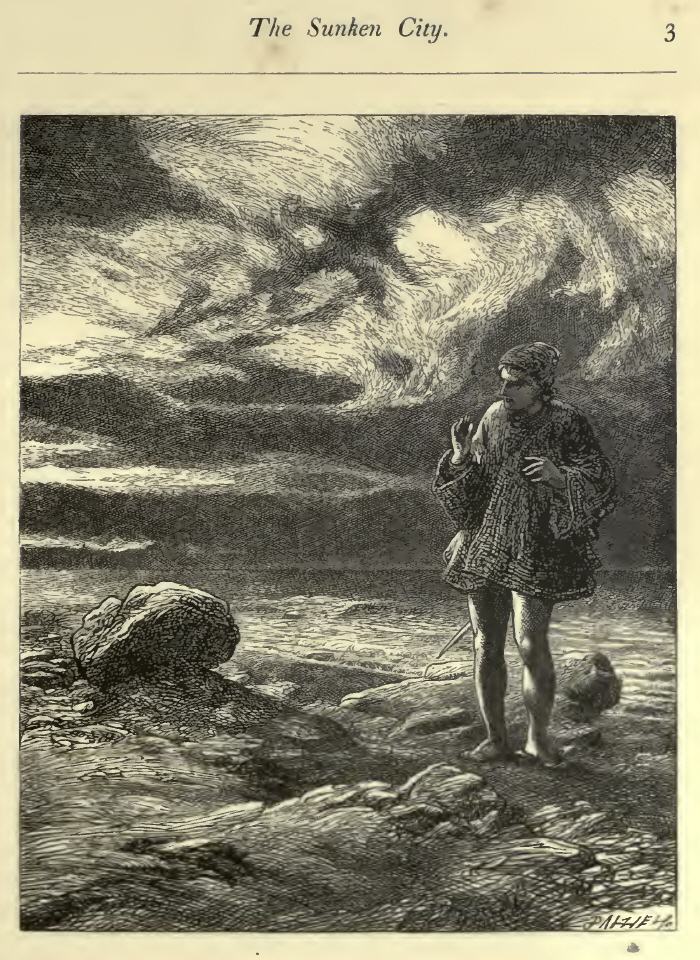 |
|||
|
Each thing of beauty Here lies the moorland, But if thou hast not Then on that moorland, It is the world 5 Like the sea-winds breathing,
SAFE in its earth nest lying, For, dearest, thine eyelid closes,
6
THE lady spake to Signelil, ‘Sma’ wonder I am sae ill and thin, ‘Before, thy cheek was rosy red, ‘I can nae longer hide ought frae thee, |
|||
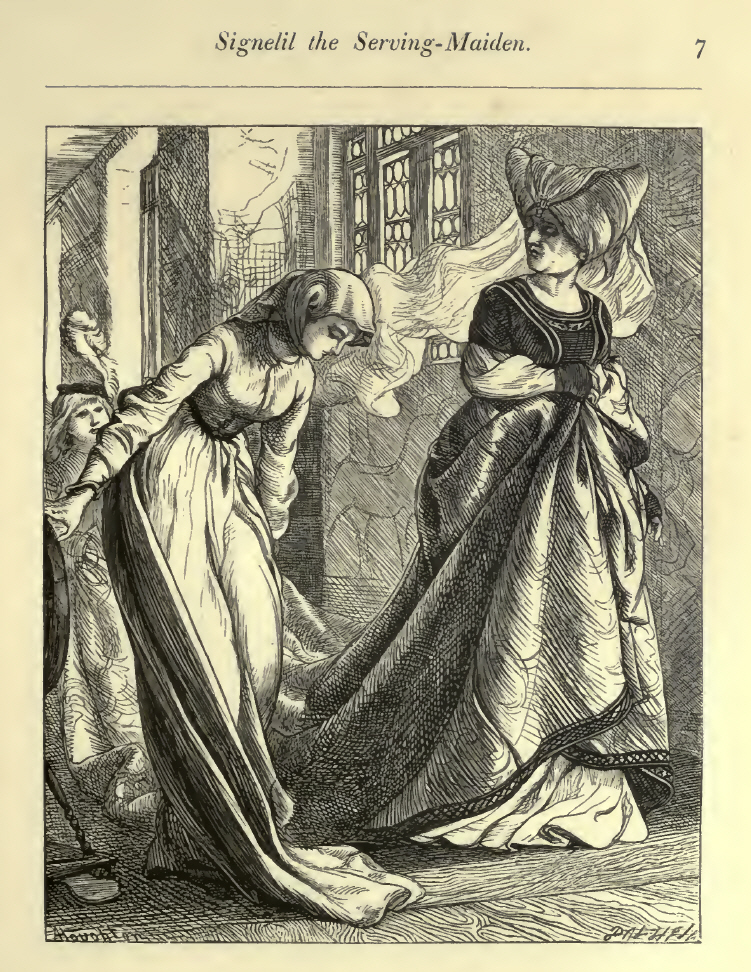 |
|
‘My son hath plighted his troth to thee, ‘He gave me the silver buckled shoon, 8 ‘He gave to me the silken sark, ‘On my finger he put a gold ring fine, ‘What matters the gifts he dared to gie, ‘Yea, he hath sworn to marry me, ‘What mattereth the oaths he swore, |
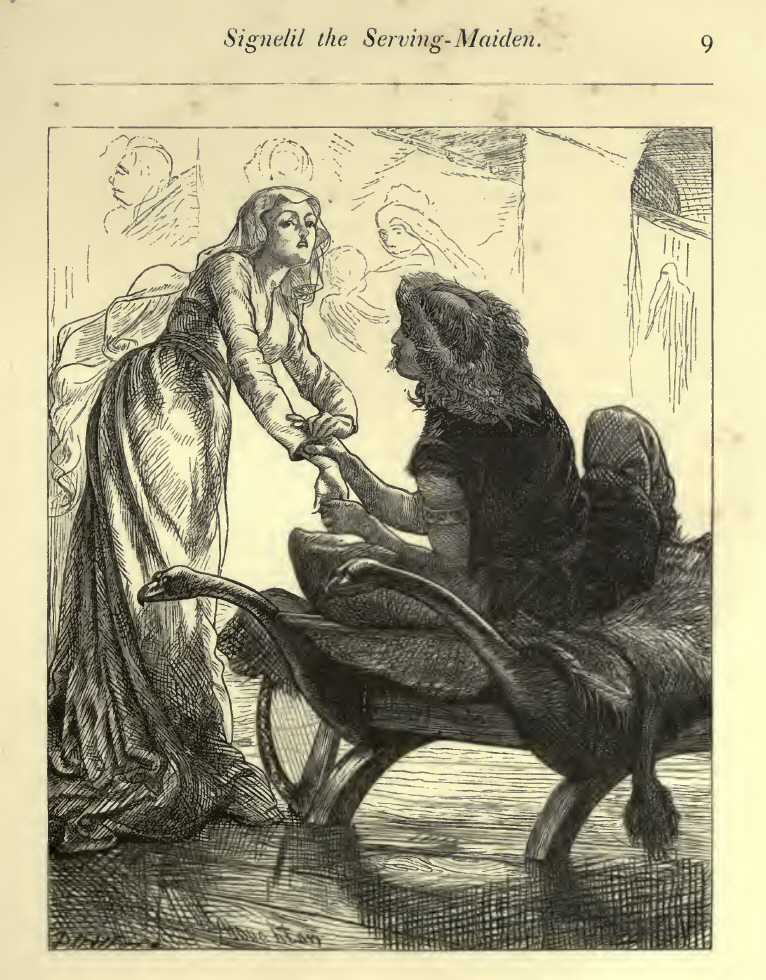 |
|
‘I hae the gift o’ minstrelsie, ‘Whene’er I take my harp on my knee, 10 She touched the string, she sang o’ love, Unto his little foot-page cried he, Upon the cushioned couch slapped he: ‘Hast thou not kissed me tenderlie? ‘Thou art my dearest, thou art my bride, Signelil is her lord’s ladie! 11
I SAW him at morning adown the green glen, I saw him at noon by the side of the stream,— I saw him when gloaming was gathering gray, And since, when ’tis dark over meadow and stream,
12
HEARKEN, child, unto a story! Watch them closely, mark them sharply, See, my child, across their shoulders It is said, these little children, |
||||||
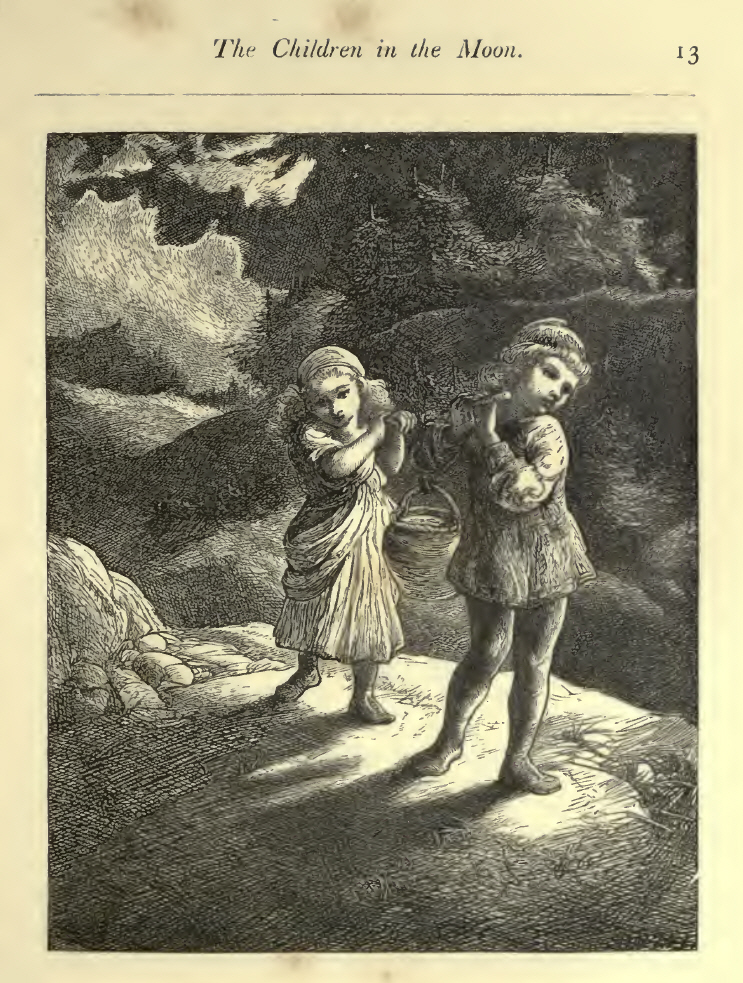 |
||||||
|
To the wayside well they trotted, Quoth the man, ‘How vexed and sulky 14 ‘To the well behind the hedgerow ‘How they please me! how they tempt me! ‘Children, aye, and children’s children, Thus the philosophic Moon-man Never is the bucket empty, Ever young and ever little, 15 Ever young and ever little, They will haunt thee from their heaven,
16
HELGA sits at her chamber door— What she should work with golden thread, What her fingers with silk should sew, One whispereth in the ear of the Queen, ‘Her seam is wildly and blindly done; The good Queen hearkens wonderingly: ‘Hearken unto me, little one! |
||||||
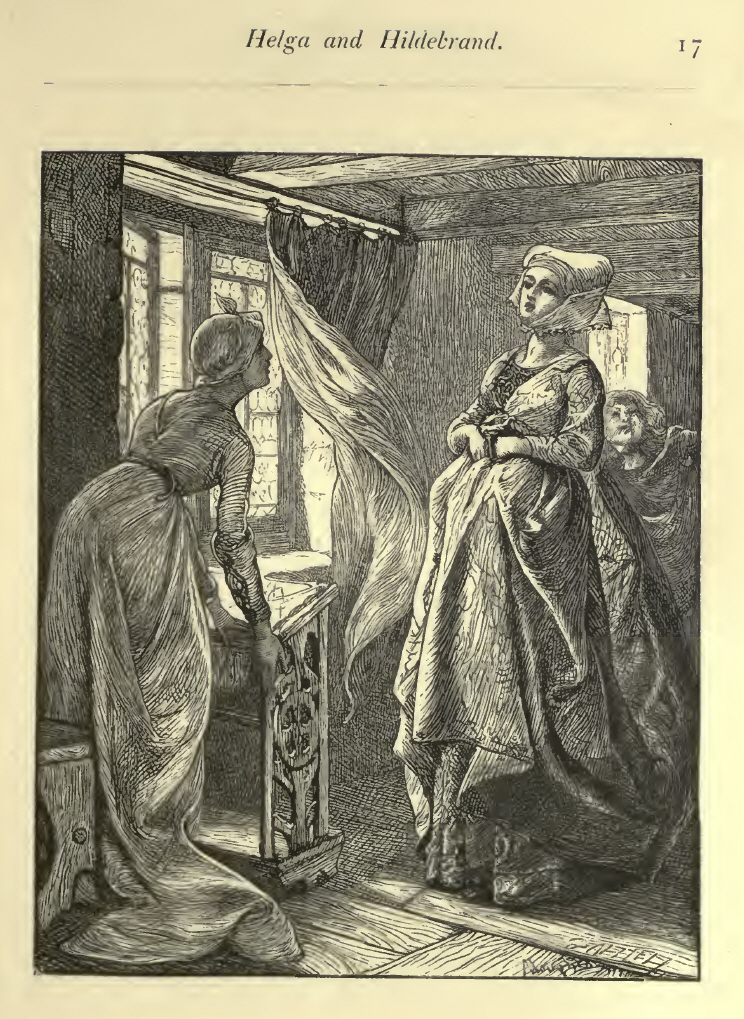 |
||||||
|
‘My seam is wild and my work is mad, ‘My father was a King so good— 18 ‘My father let me sew and spin. ‘Eleven wooed me as lovers may, ‘And he who wed me was Hildebrand, ‘Scarce did we our castle gain, ‘My father summoned his followers then: ‘“Don your breastplates and helmets bright, ‘They knocked at the door with mailèd hand: ‘Sir Hildebrand kissed me tenderly: ‘“Even if I bleeding be, ‘Out at the door sprang Hildebrand, ‘And ere the lips could mutter a prayer, 19 ‘Only the youngest slew not he— ‘Then cried I loud, “Sir Hildebrand, ‘“Oh, spare the youngest, that he may ride ‘Scarcely the words were utterèd, ‘To his saddle my brother, fierce and cold, ‘Over valley and hill he speeds; ‘Over valley and hill we fleet; ‘Through deep fords the horse can swim; ‘We came unto the castle great; ‘My brother built a tower forlorn, ‘My cruel brother placed me there, 20 ‘Whene’er I moved in my tower forlorn, ‘Whensoever I slept on the stones, ‘My brother would torture me twentyfold; ‘A clock was the price they took for me— ‘And when the clock on the kirk chimed first, Ere Helga all her tale hath said,
21
ON a hill that faced the western sea He carried with him hawk and hound, He felled the oak and the poplar white, The gumlie gnomes in the hill that dwelt, Then up and spake the smallest gnome,— 22 And up and spake the wee, wee gnome, ‘He cutteth down our forest trees, And all the gnomes that dwelt in the hill Five score of gumlie gnomes they were, The hound howled loudly at the gate, The peasant from the window looked, 23 In every nook of every room And some fled east, and some fled west, But the wee, wee gnome, with glittering eyes, The housewife forced a welcome smile, The wee, wee gnome he knit his brows, ‘But if thou wilt beneath me dwell,— 24 Then answered back the trembling wight, ‘O gracious sir! O gentle sir! “’Ho! shall I take thy goods and gold The peasant and his household quake And up and stood the peasant then, |
||||||
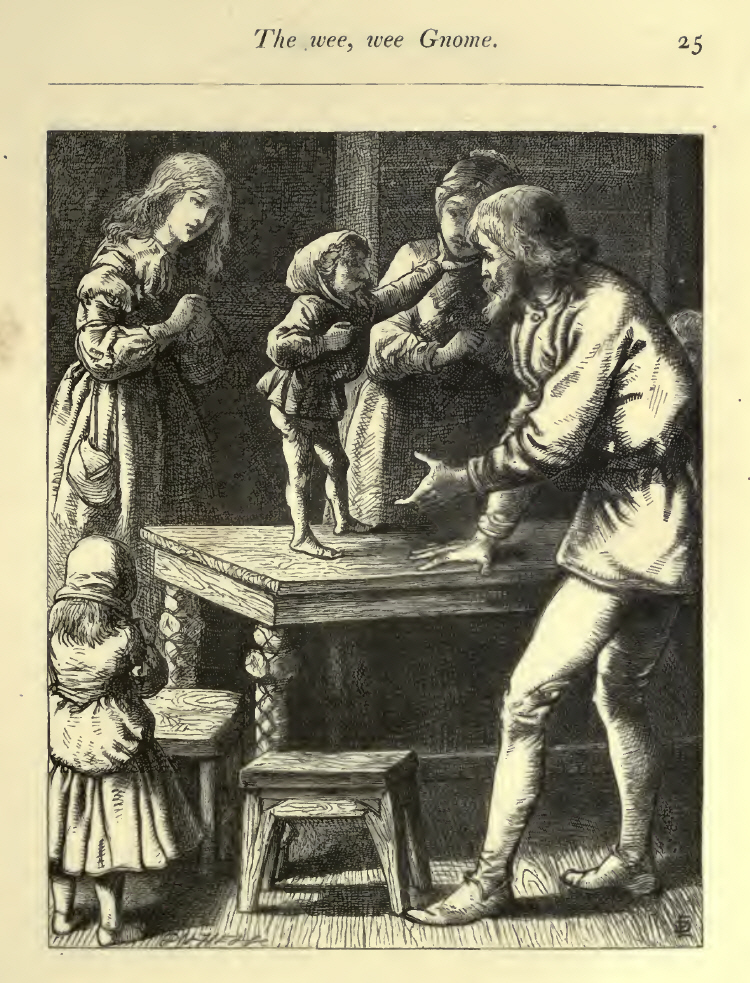 |
|
The wee, wee gnome leapt up and laughed, Her tears fell fast, as the wee, wee gnome 26 ‘I married with as braw a man He kissed her once, he kissed her twice, He kissed her once, he kissed her twice, And when she called on Mary’s Son, ‘My stepmother put a curse on me, ‘And since thou canst not,’ laughed the knight, 27 ‘But grace be thine, thou brave Eline, The peasant dwells on the hill by the sea, Now hath Eline, the true goodwife, Now reigns the daughter of Eline,
28
ONE sister to the other spake, ‘Man shall never marry me ‘How may such revenge be planned?— ‘Rich farmers dwell along the vale; They doff their garb from head to heel; Slim and tall, with downcast eyes, Their armour in the sunshine glares |
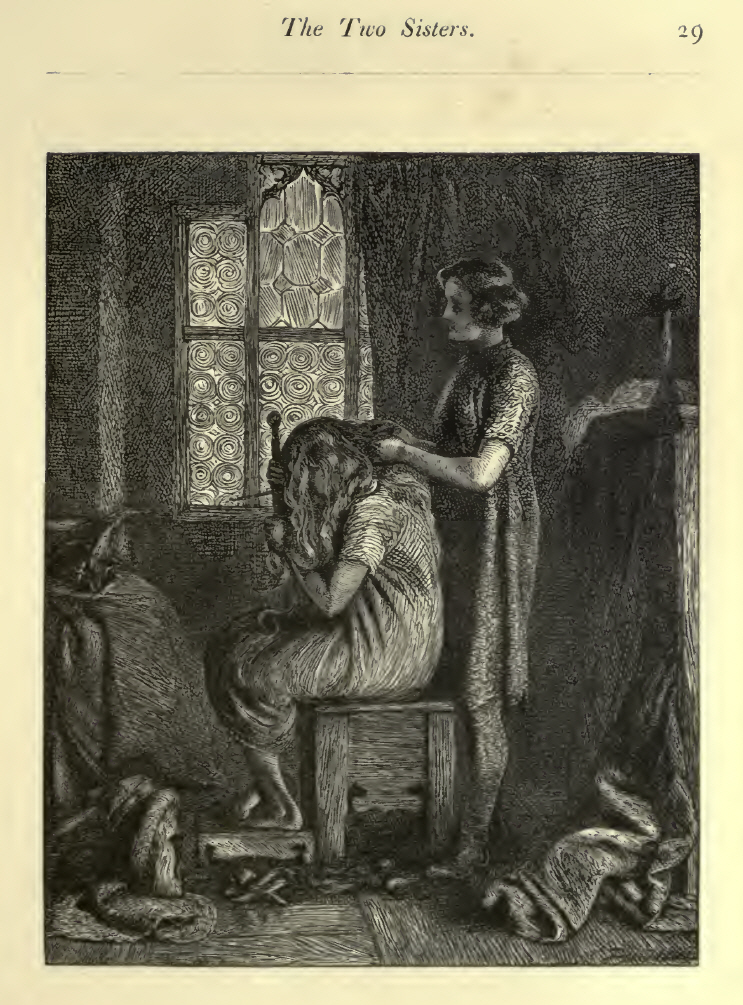 |
|
They ride unto the castle great: ‘Hail, Dame Erland!’ the sisters say; 30 ‘Herr Erland is within indeed; Into the hall the sisters go; The maidens in the chamber stand: Herr Erland slaps the cushions blue: ‘We have ridden many a mile, ‘Oh, tell me, have ye wives at home? ‘Nor wives nor bairns have we at home, ‘Then, by our Lady, ye shall try ‘Two maidens with neither mother nor sire, Paler, paler the maidens turn; ‘If they indeed so beauteous be, 31 Herr Erland shrugged his shoulders up, ‘Now, by our Lady, they were won, ‘I sought their mother to lure away, Then up they leap, those maidens fair; ‘This for tempting our mother dear!’ ‘This for the death of our father brave!’ They have hacked him into pieces, small Then stalk they forth, and forth they fare; Fridays three they in penance pray, _____
Ballad Stories of the Affections continued or back to Ballad Stories of the Affections - Contents
|
|
|
|
|
|
|